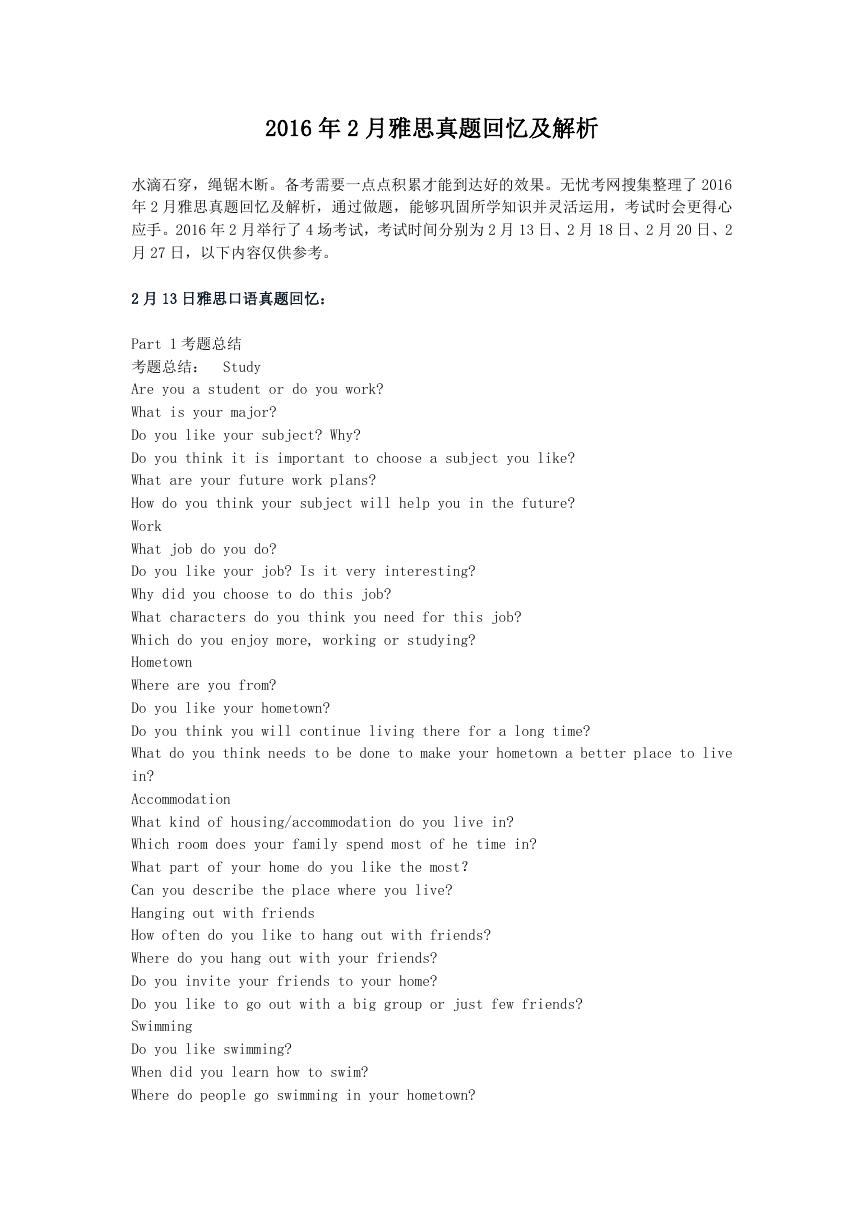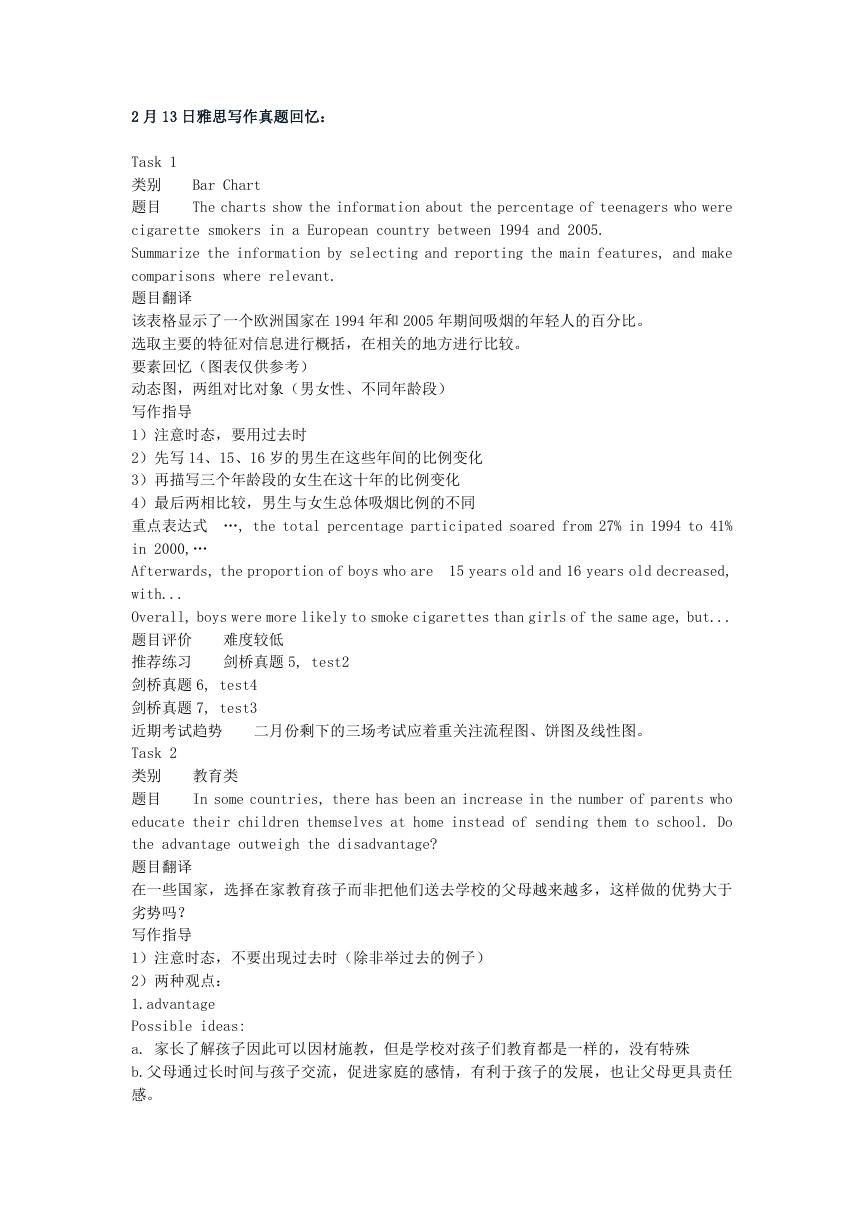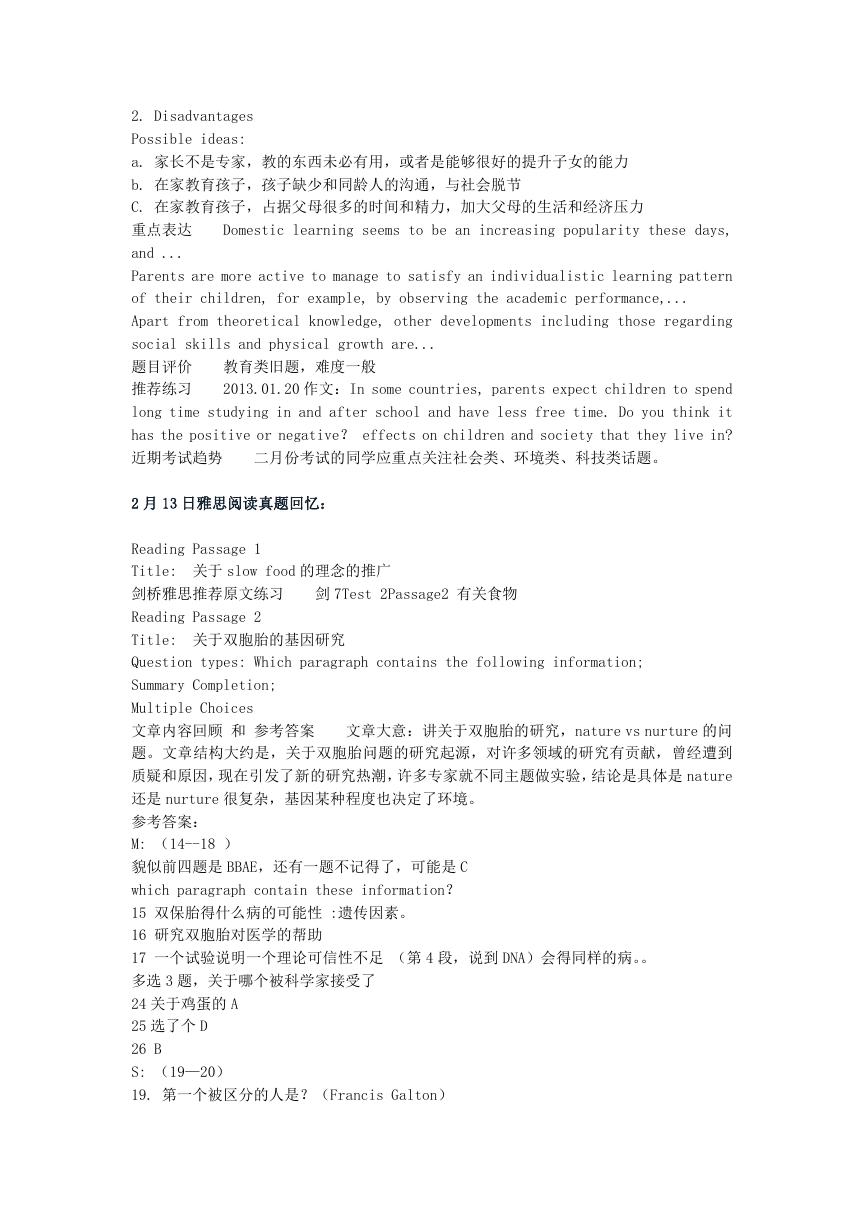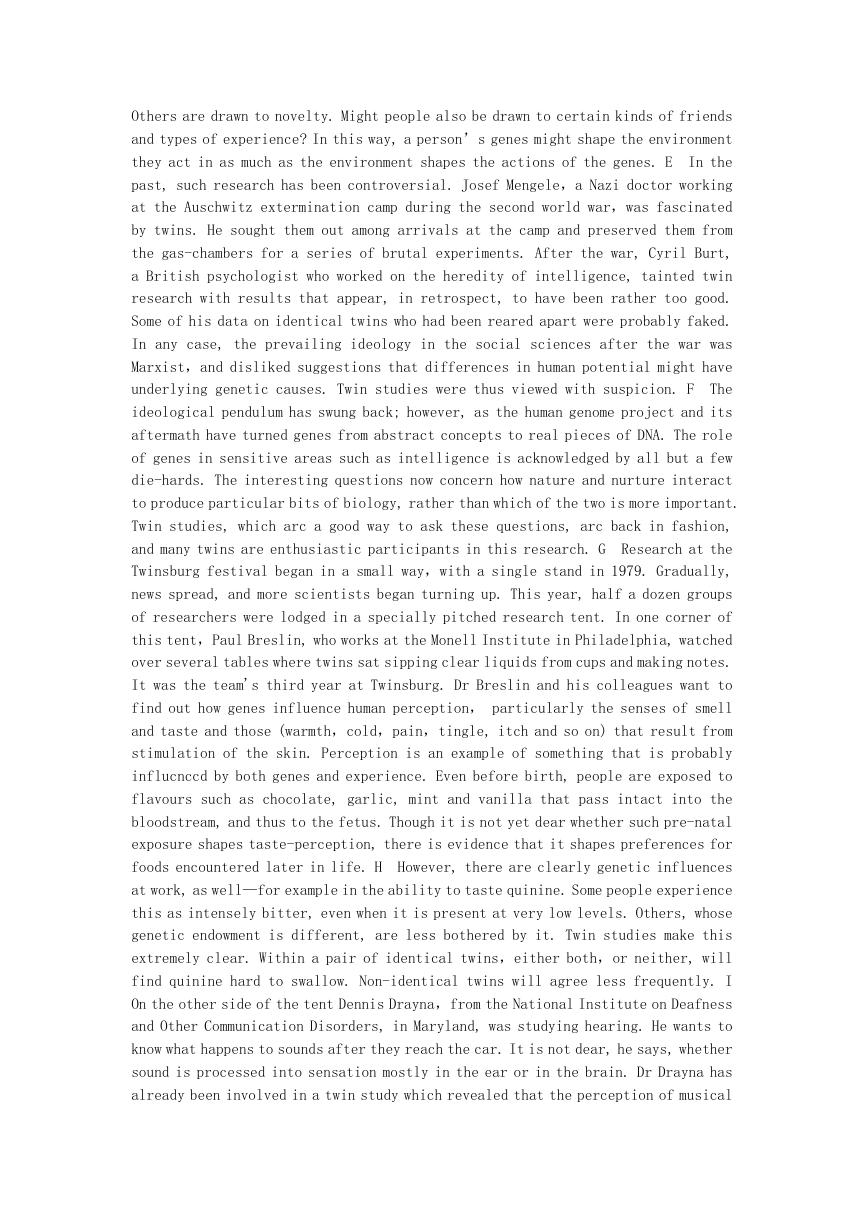2016 年 2 月雅思真题回忆及解析
水滴石穿,绳锯木断。备考需要一点点积累才能到达好的效果。无忧考网搜集整理了 2016
年 2 月雅思真题回忆及解析,通过做题,能够巩固所学知识并灵活运用,考试时会更得心
应手。2016 年 2 月举行了 4 场考试,考试时间分别为 2 月 13 日、2 月 18 日、2 月 20 日、2
月 27 日,以下内容仅供参考。
2 月 13 日雅思口语真题回忆:
Part 1 考题总结
考题总结: Study
Are you a student or do you work?
What is your major?
Do you like your subject? Why?
Do you think it is important to choose a subject you like?
What are your future work plans?
How do you think your subject will help you in the future?
Work
What job do you do?
Do you like your job? Is it very interesting?
Why did you choose to do this job?
What characters do you think you need for this job?
Which do you enjoy more, working or studying?
Hometown
Where are you from?
Do you like your hometown?
Do you think you will continue living there for a long time?
What do you think needs to be done to make your hometown a better place to live
in?
Accommodation
What kind of housing/accommodation do you live in?
Which room does your family spend most of he time in?
What part of your home do you like the most?
Can you describe the place where you live?
Hanging out with friends
How often do you like to hang out with friends?
Where do you hang out with your friends?
Do you invite your friends to your home?
Do you like to go out with a big group or just few friends?
Swimming
Do you like swimming?
When did you learn how to swim?
Where do people go swimming in your hometown?
�
Is it useful to learn swimming?
Colour
Do you like light colour or dark colour?
What colour do you prefer for your room?
What colour do you wear when you were a child?
Snacks
What kinds of snacks do you like to eat?
When do you eat snacks?
Is it healthy to eat snacks?
What were the most popular snacks when you were young?
History
Do you like to history?
Do you like films adapted from real history?
Have you ever been to history museums?
School
How old were you when you started school?
How did you get to school each day?
Are you still in contact with any of the friends you had in primary school?
What were some of the most popular activities in primary school?
Social network
Is social networking website popular in your country?
What kinds of social networking websites do you like to use?
Are you a social person?
What kinds of people do you like to be friends with on those websites?
Is it easy to find real friends on a social networking website?
In a Hurry
What was the last time you did something in a hurry?
Do you like to finish things quickly?
What kind of things will you never do in a hurry?
Why people make mistakes more easily when they are in a hurry?
Handcraft
Did you ever take handcraft lessons at school?
Do you think it is important for children to learn those skills?
Do you think children should learn more about handcrafts?
How do you think about science classes?
Group Activity/Teamwork
Do you like to work or study with others or just by yourself?
How do you think group learning?
Do you like to be a leader?
Dance
How often do you dance?
Is dancing difficult to learn?
Would you like to learn dance in the future?
Where do Chinese people like to go dancing?
�
Reading/Books
Do you like reading? Why or why not?
Did you read a lot in your childhood?
For children, what do you think are benefits of reading?
Bicycles
How often do you often ride bicycles?
Is it difficult to learn how to ride a bicycle?
Is it popular to ride bicycles in your country?
Do you think bicycle is very convenient for people to use in modern life?
Part 2&3 考题总结
考题总结: 1. Describe a foreign country you want to visit but haven’t been to.
2. Describe a street that you like the most.
3. Describe a law about environment you would like to see in your country.
4. Describe a goal you want to achieve in the future.
5. Describe a long car journey you went on.
6. Describe one of your best friends.
7. Describe a family (not your own) that you like.
8. Describe a sport you would like to try
9. Describe an art or craft activity you did at school
10. Describe a piece of clothing that was given to you.
1. What’s the difference between being a tourist or a person living in a foreign
country?
2. Why should people follow traffic rules?
3. What kinds of rules are supposed to set in schools?
4. What is the difference between dream and goal?
5. What should government do to reduce the use of cars?
6. Why do you think it is hard to maintain friendships for some people?
7. Which one is more important, friendship or family relationship?
8. Do Chinese children in school have enough time for team sports?
9. Do you think art should be included in school curriculums?
10.Do you think students need to wear school uniforms?
雅思口语趋势分析和备考指导 在考试中,每一部分都是分数评估的地方,切不可为了某
一部分而过分背诵。对于语料库,要针对自己的情况有个个性化的过程,在使用语料库的
内容时,要注意变通。
对于几个最近常考的地点类话题:想去的国家和被污染的地方,在思路的架构方面其实是
有相似之处的:什么地方,在那能见到什么做些什么,什么时候去(的)和跟谁去。为什
么想去,这个问题其实在回答见到什么和做什么时候已经在侧面体现原因了。
The foreign country I really want to visit is the U.S., where is Hollywood movies
birth place. When I become a teenager I began to have passion for Hollywood films
and TV series, and since then, the US has always been giving me this impression
that anything could happen in that wonderland. I want to see those places casted
in the movie scenes and also meet some actors and actresses if there is a chance!
2 月 13 日雅思听力真题回忆:
�
1. city 城市
Section 1
一句话简介 为婚礼安排预订酒店
详细回忆
2. menus 菜单
3. decoration
4. toast/drink
5. sandwiches
6. cake
7. 5.995 pound
8. round table 圆桌
10. 15 October
重点词汇及扩展 Section1 中考到的酒店预订场景是常见场景,一如既往的考到了日期、
钱等内容,但还考察了与婚礼有关的词汇,比如说 decoration、圆桌、toast 等。
在拼写时要注意名词单复数,还有根据字数要求填写正确的日期形式
可参考 C9T3S1,C6T4S1
Section 2
一句话简介 Local Cookery Course 当地厨艺课程
详细回忆
18.A
20.D
仅供参考,有待补充
重点词汇及扩展
Section 3
一句话简介 学生讨论心理学和市场学联合项目,探究与不同专业的人合作实验的优势。
详细回忆
有待补充
重点词汇及扩展 参考练习 C6T3S3 和 C9T1S3
Section 4
一句话简介 讨论 westland airport 的作用和机场的选址问题
详细回忆
32. international flights are mainly for : vacation 国际航班主要是度假
33. Exported electronic goods 出口电子产品
34. : Large tax/revenue contribution 收入来自税收
35. convenient linking to highway 方便连接高速公路
36-40 题是对两处选址优缺点的表格补充
重点词汇及扩展 这道题是 S4 常考题型填空题,字数要求 one word only。
在填空时要注意名词的单复数。
注意 electronic 和 electric 区别,vacation 和 vocation 的区别,容易混淆。
参考练习 C5T3S4
整体难度分析
本次考试题型依然是填空选择比例相同,以填空选择匹配题为主,但 S2S3
部分题目内容较新,难度较大,学员需补充相关场景词汇。此外,学员近期可以关注一下
S1 的租房、旅游、求职场景,S3 跟生态有关的场景词汇。
31. internal/domestic major flights are for : 国内主要航班 business
16.E
C B C A A E B C B E
�
2 月 13 日雅思写作真题回忆:
15 years old and 16 years old decreased,
Bar Chart
The charts show the information about the percentage of teenagers who were
Task 1
类别
题目
cigarette smokers in a European country between 1994 and 2005.
Summarize the information by selecting and reporting the main features, and make
comparisons where relevant.
题目翻译
该表格显示了一个欧洲国家在 1994 年和 2005 年期间吸烟的年轻人的百分比。
选取主要的特征对信息进行概括,在相关的地方进行比较。
要素回忆(图表仅供参考)
动态图,两组对比对象(男女性、不同年龄段)
写作指导
1)注意时态,要用过去时
2)先写 14、15、16 岁的男生在这些年间的比例变化
3)再描写三个年龄段的女生在这十年的比例变化
4)最后两相比较,男生与女生总体吸烟比例的不同
重点表达式 …, the total percentage participated soared from 27% in 1994 to 41%
in 2000,…
Afterwards, the proportion of boys who are
with...
Overall, boys were more likely to smoke cigarettes than girls of the same age, but...
题目评价
推荐练习
剑桥真题 6, test4
剑桥真题 7, test3
近期考试趋势
Task 2
教育类
类别
题目
In some countries, there has been an increase in the number of parents who
educate their children themselves at home instead of sending them to school. Do
the advantage outweigh the disadvantage?
题目翻译
在一些国家,选择在家教育孩子而非把他们送去学校的父母越来越多,这样做的优势大于
劣势吗?
写作指导
1)注意时态,不要出现过去时(除非举过去的例子)
2)两种观点:
1.advantage
Possible ideas:
a. 家长了解孩子因此可以因材施教,但是学校对孩子们教育都是一样的,没有特殊
b.父母通过长时间与孩子交流,促进家庭的感情,有利于孩子的发展,也让父母更具责任
感。
难度较低
剑桥真题 5, test2
二月份剩下的三场考试应着重关注流程图、饼图及线性图。
�
Domestic learning seems to be an increasing popularity these days,
2. Disadvantages
Possible ideas:
a. 家长不是专家,教的东西未必有用,或者是能够很好的提升子女的能力
b. 在家教育孩子,孩子缺少和同龄人的沟通,与社会脱节
C. 在家教育孩子,占据父母很多的时间和精力,加大父母的生活和经济压力
重点表达
and ...
Parents are more active to manage to satisfy an individualistic learning pattern
of their children, for example, by observing the academic performance,...
Apart from theoretical knowledge, other developments including those regarding
social skills and physical growth are...
教育类旧题,难度一般
题目评价
推荐练习
2013.01.20 作文:In some countries, parents expect children to spend
long time studying in and after school and have less free time. Do you think it
has the positive or negative? effects on children and society that they live in?
近期考试趋势
二月份考试的同学应重点关注社会类、环境类、科技类话题。
2 月 13 日雅思阅读真题回忆:
剑 7Test 2Passage2 有关食物
Reading Passage 1
Title: 关于 slow food 的理念的推广
剑桥雅思推荐原文练习
Reading Passage 2
Title: 关于双胞胎的基因研究
Question types: Which paragraph contains the following information;
Summary Completion;
Multiple Choices
文章内容回顾 和 参考答案
文章大意:讲关于双胞胎的研究,nature vs nurture 的问
题。文章结构大约是,关于双胞胎问题的研究起源,对许多领域的研究有贡献,曾经遭到
质疑和原因,现在引发了新的研究热潮,许多专家就不同主题做实验,结论是具体是 nature
还是 nurture 很复杂,基因某种程度也决定了环境。
参考答案:
M: (14--18 )
貌似前四题是 BBAE,还有一题不记得了,可能是 C
which paragraph contain these information?
15 双保胎得什么病的可能性 :遗传因素。
16 研究双胞胎对医学的帮助
17 一个试验说明一个理论可信性不足 (第 4 段,说到 DNA)会得同样的病。。
多选 3 题,关于哪个被科学家接受了
24 关于鸡蛋的 A
25 选了个 D
26 B
S: (19—20)
19. 第一个被区分的人是?(Francis Galton)
�
(相似文章仅供参考):Twin Study: Two of a kind
20 “从哪一年开始允许对双胞胎进行医学上的试验的?
19XX (第一段)
M:选 3 个 关于一个方面的研究
选项有 CANCER,听力,头发,药物试验 vitD 过敏
21 人体的感觉 A
22(忘了)E?
23 头发的脱落 F
24-26 哪三个得到科学证实? (不记得选哪个了)
选项有:VC 有助于治病(感冒)是不对的
怀孕女人吃甜的影响更大,皮肤什么什么
吸烟者后天影响比基因影响大
相关英文原文阅读
A
THE scientific study of twins goes back to the late 19th century, when Francis
Galton, an early geneticist, realised that they came in two varieties: identical
twins born from one egg and non-identical twins that had come from two. That insight
turned out to be key, although it was not until 1924 that it was used to formulate
what is known as the twin rule of pathology,and twin studies really got going.
B
The twin rule of pathology states that any heritable disease will be more
concordant (that is, more likely to be jointly present or absent) in identical twins
than in non-identical twins-- and, in turn, will be more concordant in non-identical
twins than in non-siblings. Early work, for example, showed that the statistical
correlation of skin-mole counts between identical twins was 0.4, while
non-identical twins had a correlation of only 0.2. (A score of 1.0 implies perfect
correlation, while a score of zero implies no correlation.) This result suggests
that moles arc heritable, but it also implies that there is an environmental
component to the development of moles, otherwise the correlation in identical twins
would be close to 1.0. C
Twin research has shown that whether or not someone lakes
up smoking is determined mainly by environmental factors, but once he does so, how
much he smokes is largely down to his genes. And while a person's religion is dearly
a cultural attribute, there is a strong genetic component to religious
fundamentalism. Twin studies are also unraveling the heritability of various
aspects of human personality. Traits from neuroticism and anxiety to thrill- and
novelty- seeking all have large genetic components. Parenting matters, but it does
not determine personality in the way that some had thought. D
More importantly,
perhaps, twin studies are helping the understanding of diseases such as cancer,
asthma,osteoporosis, arthritis and immune disorders. And twins can be used,within
ethical limits, for medical experiments. A study that administered vitamin C to
one twin and a placebo to the other found that it had no effect on the common cold.
The lesson from all today's twin studies is that most human traits are at least
partially influenced by genes. However, for the most part, the age-old dichotomy
between nature and nurture is not very useful. Many genetic programs are open to
input from the environment , and genes arc frequently switched on or off by
environmental signals. It is also possible that genes themselves influence their
environment. Some humans have an innate preference for participation in sports.
�
Others are drawn to novelty. Might people also be drawn to certain kinds of friends
and types of experience? In this way, a person’s genes might shape the environment
they act in as much as the environment shapes the actions of the genes. E
In the
past, such research has been controversial. Josef Mengele,a Nazi doctor working
at the Auschwitz extermination camp during the second world war,was fascinated
by twins. He sought them out among arrivals at the camp and preserved them from
the gas-chambers for a series of brutal experiments. After the war, Cyril Burt,
a British psychologist who worked on the heredity of intelligence, tainted twin
research with results that appear, in retrospect, to have been rather too good.
Some of his data on identical twins who had been reared apart were probably faked.
In any case, the prevailing ideology in the social sciences after the war was
Marxist,and disliked suggestions that differences in human potential might have
underlying genetic causes. Twin studies were thus viewed with suspicion. F
The
ideological pendulum has swung back; however, as the human genome project and its
aftermath have turned genes from abstract concepts to real pieces of DNA. The role
of genes in sensitive areas such as intelligence is acknowledged by all but a few
die-hards. The interesting questions now concern how nature and nurture interact
to produce particular bits of biology, rather than which of the two is more important.
Twin studies, which arc a good way to ask these questions, arc back in fashion,
and many twins are enthusiastic participants in this research. G
Research at the
Twinsburg festival began in a small way,with a single stand in 1979. Gradually,
news spread, and more scientists began turning up. This year, half a dozen groups
of researchers were lodged in a specially pitched research tent. In one corner of
this tent,Paul Breslin, who works at the Monell Institute in Philadelphia, watched
over several tables where twins sat sipping clear liquids from cups and making notes.
It was the team's third year at Twinsburg. Dr Breslin and his colleagues want to
find out how genes influence human perception, particularly the senses of smell
and taste and those (warmth,cold,pain,tingle, itch and so on) that result from
stimulation of the skin. Perception is an example of something that is probably
influcnccd by both genes and experience. Even before birth, people are exposed to
flavours such as chocolate, garlic, mint and vanilla that pass intact into the
bloodstream, and thus to the fetus. Though it is not yet dear whether such pre-natal
exposure shapes taste-perception, there is evidence that it shapes preferences for
foods encountered later in life. H
However, there are clearly genetic influences
at work, as well—for example in the ability to taste quinine. Some people experience
this as intensely bitter, even when it is present at very low levels. Others, whose
genetic endowment is different, are less bothered by it. Twin studies make this
extremely clear. Within a pair of identical twins,either both,or neither, will
find quinine hard to swallow. Non-identical twins will agree less frequently. I
On the other side of the tent Dennis Drayna,from the National Institute on Deafness
and Other Communication Disorders, in Maryland, was studying hearing. He wants to
know what happens to sounds after they reach the car. It is not dear, he says, whether
sound is processed into sensation mostly in the ear or in the brain. Dr Drayna has
already been involved in a twin study which revealed that the perception of musical
�
















 2023年江西萍乡中考道德与法治真题及答案.doc
2023年江西萍乡中考道德与法治真题及答案.doc 2012年重庆南川中考生物真题及答案.doc
2012年重庆南川中考生物真题及答案.doc 2013年江西师范大学地理学综合及文艺理论基础考研真题.doc
2013年江西师范大学地理学综合及文艺理论基础考研真题.doc 2020年四川甘孜小升初语文真题及答案I卷.doc
2020年四川甘孜小升初语文真题及答案I卷.doc 2020年注册岩土工程师专业基础考试真题及答案.doc
2020年注册岩土工程师专业基础考试真题及答案.doc 2023-2024学年福建省厦门市九年级上学期数学月考试题及答案.doc
2023-2024学年福建省厦门市九年级上学期数学月考试题及答案.doc 2021-2022学年辽宁省沈阳市大东区九年级上学期语文期末试题及答案.doc
2021-2022学年辽宁省沈阳市大东区九年级上学期语文期末试题及答案.doc 2022-2023学年北京东城区初三第一学期物理期末试卷及答案.doc
2022-2023学年北京东城区初三第一学期物理期末试卷及答案.doc 2018上半年江西教师资格初中地理学科知识与教学能力真题及答案.doc
2018上半年江西教师资格初中地理学科知识与教学能力真题及答案.doc 2012年河北国家公务员申论考试真题及答案-省级.doc
2012年河北国家公务员申论考试真题及答案-省级.doc 2020-2021学年江苏省扬州市江都区邵樊片九年级上学期数学第一次质量检测试题及答案.doc
2020-2021学年江苏省扬州市江都区邵樊片九年级上学期数学第一次质量检测试题及答案.doc 2022下半年黑龙江教师资格证中学综合素质真题及答案.doc
2022下半年黑龙江教师资格证中学综合素质真题及答案.doc